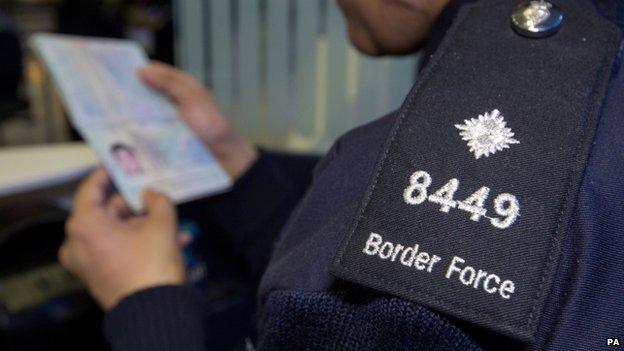Analysis: David Cameron's 'agonising' EU immigration speech
- Published
- comments

It is a speech which David Cameron and his advisers have agonised over for months.
Ideas for it have been floated in the media, tested in capitals across Europe, debated with civil servants and, no doubt, market tested as well.
What is revealing is not just what has stayed in but what has come out.
In - and the centrepiece of the prime minister's proposals to cut EU immigration - is a proposal for a significant new limit on benefits paid to those in work. It is a recognition that what attracts people to the UK is not just the availability of jobs and decent wages (relative to those available at home) but the fact that money is topped up by the state.
So David Cameron will argue today that no EU worker should be able to claim tax credits, social or council housing until they have lived and worked in the UK for four years. What's more, no child benefit or credit should be sent to children living abroad. This is a tougher version of an approach already set out by Labour and the Liberal Democrats.
What is not in the speech is just as interesting. After months of floating the idea of a cap or limit to the numbers coming here or a so-called emergency brake, all such ideas have been abandoned.
Cameron's advisers have concluded that it would not just be tough to negotiate but very difficult to implement in practice - for example, how many German bankers would the cap permit? How would a Lithuanian who claims to be coming for a holiday be distinguished from one declaring they want to work?
Missing too will be the promise which some in his party have demanded that he will campaign to leave the EU in a future referendum if he doesn't get his way.
The Tory leader will say, instead, that cutting EU migration will be "an absolute requirement" in a renegotiation of Britain's EU membership and he will "rule nothing out" if he doesn't get that agreement. He will repeat his view that he can and will get a better deal for Britain.
The test Number 10 has set for this speech is that it is seen as tough but deliverable - EU ambassadors have been invited to view it at the Foreign Office before receiving a briefing from the Europe minister - and that it must not sound like the sort of speech Nigel Farage would give. There will be praise for the contribution immigrants have made and continue to make.
All of which means it is sure to disappoint arch-Eurosceptics who wanted the prime minister to pick a fight with the EU over immigration which they believed Britain could not win and which would, therefore, lead the country towards the exit.
- Published27 November 2014
- Published28 November 2014
- Published27 November 2014